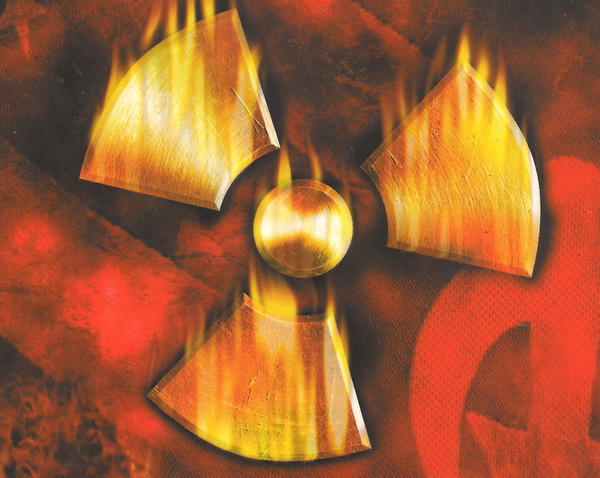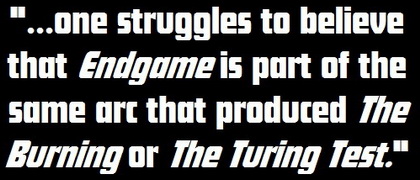|
| |
|
STORY PLACEMENT THIS STORY TAKES PLACE AROUND SEVEN YEARS AFTER THE END OF THE NOVEL "THE TURING TEST," AND AROUND THIRTY YEARS PRIOR TO THE START OF THE NOVEL "FATHER TIME."
WRITTEN BY TERRANCE DICKS
RECOMMENDED PURCHASE OFFICIAL BBC 'EIGHTH DOCTOR' PAPERBACK (ISBN 0-563-53822-8) RELEASED IN NOVEMBER 2000.
BLURB The Players have ALL decided on an Endgame. Play ends only when one side has been annihilated - even if the planet is TOTALLY destroyed in the process. They weren't expecting the Doctor to be one of their pieces - and neither was he. He doesn't want to get
involved. know who he is - but he's fast ceasing to care. Caught up in ennui, nothing seems to matter to him. He has no interest in the Cold War, OR in spies, double agents
or secret documents. to take an active role. Because as far as the authorities are concerned, the Doctor is The Third Man... |
|
|
Endgame NOVEMBER 2000
Terrance Dicks was a curious choice to pen a novel in this heavily-stylised ‘eighth Doctor lost on Earth’ arc. Particularly when released between profound literary dramas the like of The Turing Test and Father Time, a rollicking yarn from Uncle Terrance was always going to feel a little blithe and a little discordant. However, for all its nonchalance, Endgame does its job well, telling a neat and tidy story - with neat and tidy hair - that offers the reader a little respite from the weight of surrounding stories, as well as providing a timely reminder that the darkness is worth nought without the light.
Endgame has an devastating sense of fun about it; a buoyancy that initially seems at odds with the Cold War setting and nuclear warning symbol emblazoned on its cover. However, once the reader has resigned himself to the confines of Dicks’ colourful little world - over-flowing as it is with homosexual spies, their asinine appellations, and their insatiable thirst for drink - the pages of painless prose just fly by. I don’t think that it’s ever taken me more than a couple of hours to tear through this one.
Endgame apart from Players which it follows, and World Game which would follow it. Once again Dicks’ Players are stage-managing world leaders, the only difference being that this time around, the consequences are a little higher. Stalin and Truman are both sat on potentially apocalyptic nuclear arsenals, and both seem suddenly eager to use them…
True to form, Dicks shoehorns a few historical factoids into the piece – references to the Marshall Plan and Truman’s unlikely ascent to the United States’ Presidency are woven in between James Bond-like set pieces, instilling such a Target-like taste that one struggles to believe that Endgame is part of the same arc that produced The Burning or The Turing Test. Indeed, this novel is predicated on a classic 1970s Who paradigm; even its Doctor is world-weary and reticent, beset by ennui. The portrayal here is a little more sophisticated than it was back in Jon Pertwee’s day, admittedly, Dicks playing the stale, but nonetheless effective, “I’ll outlive all my friends” card to surprisingly stirring effect.
The book also features one or two moments of unexpected initiative, such as the Doctor’s exciting encounter with the Countess and what she offers him - the ramifications of which would linger right until the range’s final novel – and even his increased calling upon alien knowledge that he still can’t account for. Whether these things were the work of the author, however, I can’t say - given that Dicks turned in a late, under-length manuscript and then buggered off on holiday, I wouldn’t be surprised if editor Justin Richards was responsible for Endgame’s more triumphant touches.
And so for a novel that’s author couldn’t bother to finish it, Endgame
is, astonishingly, really quite an enjoyable read. Bright, breezy and
almost farcically frivolous, this one isn’t even in the same league as its
lofty peers, but there’s still no need to burn it after reading.
|
|
|
Copyright © E.G. Wolverson 2010
E.G. Wolverson has asserted his right under the Copyright, Designs and Patents Act, 1988 to be identified as the author of this work. |
|
|
For the eighth Doctor, this story takes place approximately seven years after the end of The Turing Test. Following Alan Turing’s suicide three years after the events of this novel, the Doctor resumes the dragon hunt told of in The Year of Intelligent Tigers before taking refuge in a Tibetan monastery, where he would remain until 1962. Thereafter little is known of the Doctor’s exploits prior the 1980s, though the short story Mordieu posited that the Doctor would spend some of the intervening years working as movie screenwriter in Hollywood (a plausible conceit, given his literary aspirations explored in Wolfsbane).
The prologue featuring the seventh Doctor and Ace at the Festival of Britain takes place just after the events of the novel Timewyrm: Exodus.
|
|
|
Unless otherwise stated, all images on this site are copyrighted to the BBC and are used solely for promotional purposes. ‘Doctor Who’ is copyright © by the BBC. No copyright infringement is intended. |
|

.jpg)
.jpg)

 Narratively,
there is little to set
Narratively,
there is little to set